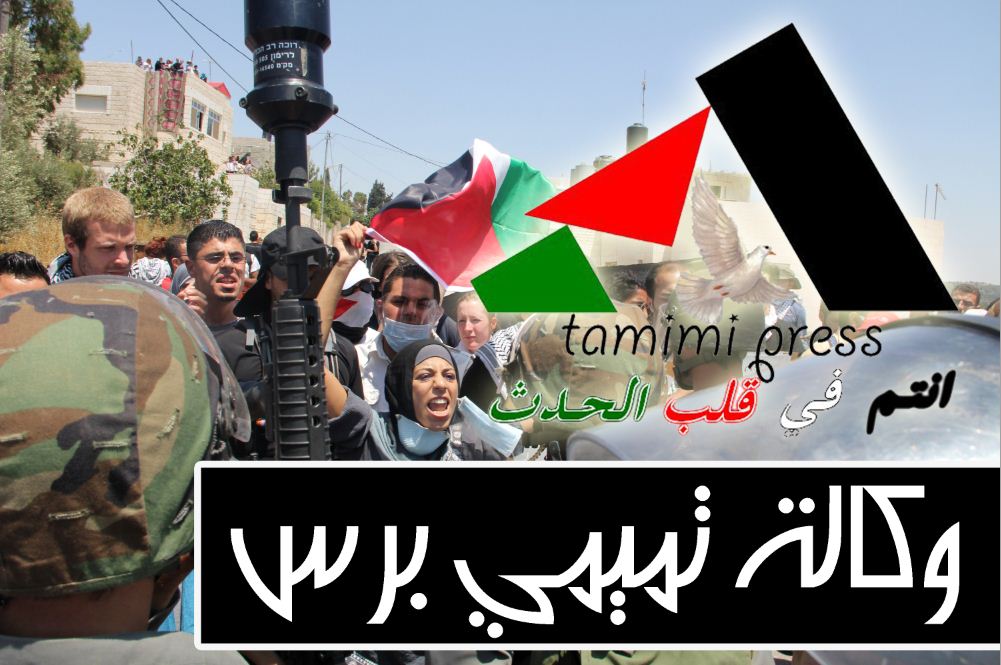 by MOHAMMAD ATAALLAH TAMIMI-TAMIMI PRESS[i]
by MOHAMMAD ATAALLAH TAMIMI-TAMIMI PRESS[i]
Palestinian security sources said that the clashes erupted in the villages of Bil'in and Ni'lin to the west of Ramallah, in Al-Nabi Saleh to the southwest of Ramallah and in Al-Mi'sarah, to the south of Bethlehem.
The sources said that dozens of protestors suffered from gas inhalation. The sources said that Israeli soldier shot and wounded Palestinian youth Kamel al-Khatib by a live bullet during the Bil'in clashes. He was evacuated to the Ramallah hospital for treatment.
In Al-Mi'sarah, Palestinian medical sources said that several activists lost consciousness due to gas inhalation. They received medical treatment at the scene, the sources added.
Israeli security sources said that the soldiers used rubber-coated metal bullets and tear gas canisters to disperse the "rioters who were hurling stones at the Israeli security forces.
Meanwhile, the Bil'in Popular Committee Against the Wall and Settlements slammed the Israeli Military court of Ofer for its refusal to release top Palestinian peace activist Abdullah Abu Rahmeh.
Abu Rahmeh, the coordinator of the Bil'in Popular Committee Against the Wall and Settlements, completed his one year imprisonment sentence on Thursday.
In October, the Ofer court sentenced Abu Rahmeh for organizing and participating in illegal and unlicensed demonstrations. He was also sentenced to 6 months suspended sentence and a 3,000 Israeli shekel ($837) fine.
Abu Rahmeh was arrested last year by Israeli soldiers who raided his Ramallah's home at the middle of the night and was subsequently indicted before an Israeli military court on unsubstantiated charges that included stone-throwing and arms possession. He was cleared of both the stone-throwing and arms possession charges, but convicted of organizing illegal demonstrations and incitement to violence.
Abdullah's conviction was subject to harsh international criticism by the EU foreign policy chief, Catherine Ashton and the Spanish Parliament.
Members of the Elders, a group of international public figures noted as elder statesmen, peace activists, and human rights advocates including Nelson Mandela and Archbishop Desmond Tutu, called on Israel to overturn Abu Rahmeh's conviction.
International human rights organizations Amnesty International and Human Rights Watch also denounced his conviction.
This Bil'in resistance style is taking place also in other villages in the West Bank, but Bil'in has become a symbol: Since 2005 residents of Bil'in responded in fact with a peaceful and non-violent resistance to the separation wall, that far from the Green line, snakes deeply inside the West Bank annexing 1,968 of 4,040 dunums of Bil'in lands.
In a non-binding advisory opinion delivered on 9 July 2004, the ICJ, the principal judicial organ of the United Nations, said Israel must cease construction of the wall and dismantle sections located in the occupied territories forthwith; repeal or render ineffective all related legislative and regulatory acts; compensate for damage caused; and, return Palestinian property or provide compensation if restitution is not possible.
Turning to the obligations of other states, the ICJ recommended that they should neither recognize the wall nor provide aid or assistance to maintain the circumstances created by its construction; prevent any impediment, created by the wall's construction, to the exercise of the right of the Palestinian people to self-determination; and, ensure Israel's compliance with international humanitarian law. It called on the UN to consider what further action was needed to end the illegal situation caused by the walls construction.
The wall is build out of cements with a height of 4.5 and 9 meters in the Palestinian populated areas, and electronic fence in the areas that are not populated. Israel made the decision to build up the wall in 2002.
Israeli High Court of Justice decided in September 2007 that the construction of the wall causes severe damages to residents of the village and demanded the government map out alternative route for the wall.
However, six years after the ruling, Palestinian officials voiced despair for the international failure to stop constructing the snake-shape wall that far from the Green line had swallowed large areas of the Palestinian territories.
Palestinian officials said that over the past six years, Israel has already confiscated large areas of lands and finalized 95 percent of the separation wall, adding that the wall is considered as one of the most dangerous Israeli settlement plans in the Palestinian territories since the June 1967.





